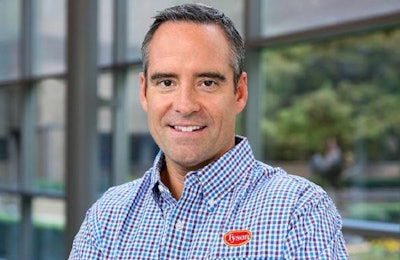
Editor’s note: This is the third in a series that looks at the growth of the plant-based protein industry and how it could impact the poultry industry. Part I focuses on how plant protein won’t replace poultry and Part II covers leaders in the global meatless protein industry.
Tyson Foods CEO Tom Hayes said recently that the company is “openly disrupting” itself with some of its recent ventures, perhaps most notably its investments into the plant-based protein company “Beyond Meat.”
Tyson Foods in 2016 bought a 5 percent stake in the company, and furthered its investment in Beyond Meat in December 2017, although it did not disclose the terms of the 2017 agreement.
Hayes, speaking during the Consumer Analyst Group of New York (CAGNY) conference in February, stressed that the company’s investment into meatless proteins is a way to help meet the growing demand for protein products, regardless of the source of the protein.
“Over the last 60 years, protein has been growing globally at least 3 percent or more,” Hayes said, adding that protein consumption will continue to grow. Nearly all people are seeking to add more protein to their diets, he said at the conference.
Tyson Foods is the largest broiler company in the United States, but is also one of the nation’s top beef, pork and turkey processors. While Tyson’s involvement in the plant-based protein industry is that of an investor instead of as a processor, it is now happy to be a part of that field.
“We play across beef, pork and chicken, of course. We are also playing across plant-based protein,” said Hayes. “We are openly disrupting ourselves, to continue to drive to the next level of improvement, and to the next level of advantage for us and our shareholders.”
Diversifying while preserving heritage
At the same time Hayes touted the company’s diversification, he said Tyson Foods continues to embrace its heritage in the broiler industry.
“We are very proud of our heritage. Our heritage is in chicken,” Hayes said.
And while Hayes says the company is becoming more of a modern food company, it is moving forward with its broiler operations.
According to WATT PoultryUSA’s 2018 Top Broiler Companies survey, Tyson Foods, produced 174.80 million pounds of ready-to-cook chicken on a weekly basis in 2017, an increase of 510,000 pounds – or about .29 percent – from 2016.
The company continues that trend of growth.
In November 2017, Tyson Foods announced that it would build a $300 million broiler complex in Humboldt, Tennessee, to help the company meet the strong consumer demand for its chicken.
The new Tyson Foods plant will produce pre-packaged trays of fresh chicken for retail grocery stores nationwide and is expected to process 1.25 million birds per week, increasing Tyson Foods’ overall production capacity by the same amount.
The facility in Humboldt is expected to begin operations in late 2019.















